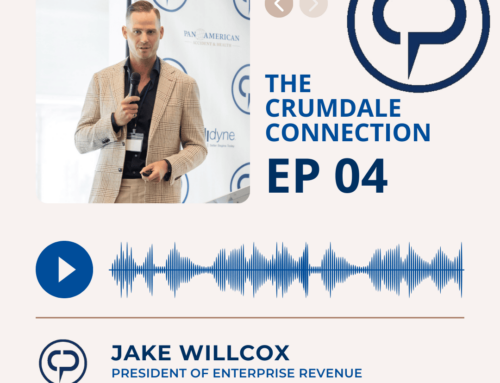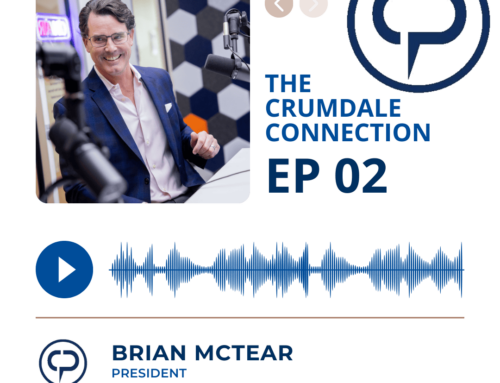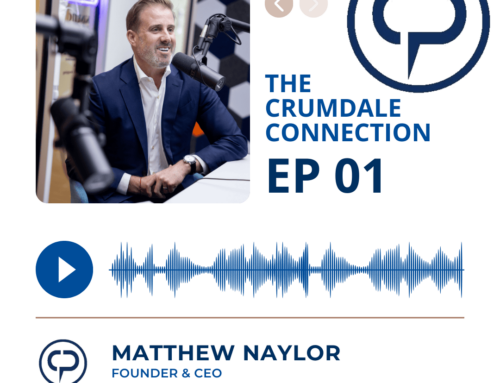The Crumdale Connection | EP 03 Jim Andrews Transcript
[Jessica Willingham] Welcome to the Crumdale Connection. I’m your host, Jessica Willingham. I’m speaking with Crumdale Partners Chief Revenue Officer, Jim Andrews. Welcome Jim.
[Jim Andrews] Hey, Jess, thanks for having me today.
[Jessica Willingham] You head up the Sales side of the organization, what products and solutions are your team bringing to your broker partners?
[Jim Andrews] I think there’s a plethora of options we have here at Crumdale Partners that separates us from the marketplace. You know, the first thing would be our risk and compliance, which every organization needs to have based on all the laws and challenges at the federal and state level. You know, things like plan documents, ERISA wraps, anything around the ACA. So very helpful to have the people, ERISA attorneys and actuaries, on staff who really help us, you know, have that in-house feel for everyone.
[Jessica Willingham] And then, PBM – what does that stand for and how does that work for you?
[Jim Andrews] Sure, Pharmacy Benefit Management is something that’s very unique. A lot of people do it in the industry, and how they do it – there’s a lot of different ways to skin that cat – but the way we do it internally at Crumdale, which makes us unique, is truly our people. You know the people that run that organization, we have Dr. Eric Emerson who’s our in-house pharmacist, Jason Lohman, who’s world-class in, you know, his knowledge of contracts and negotiations, and all the hidden challenges you see in the PBM space, and then we have a whole other team behind that. But, you know, what they’ve been able to do is put our clients and partners in the best position to win. There’s a lot of intricacies and contracts that could be 70, 80, 90 pages long, and there’s a lot of hidden gaps. And so, what we try and do is do two things, the best clinical care you can get, at the lowest net cost. And within that, again, we try and do what’s best for the client at all times, but it’s really our fastest growing, and our biggest segment of the organization currently.
[Jessica Willingham] And what are the other pieces of the puzzle that you help put together?
[Jim Andrews] Yeah, so we also have stop loss, which is really unique. And I think our special sauce is being an MGU, a Managing General Underwriter. And what that allows us to do is, “the power of the pen,” as we say, it allows us to take up to a risk position of up to 49% on all of our deals with our clients. So, in essence what that does is, it allows us to be partnered with all of our clients. So, if the client is running well, we’re running well, we’re making money. So, it’s hand in hand in how this works, and healthcare is not that way. Healthcare is all about them winning and the client just kind of paying a price from that perspective. But it allows us to have better insight, to be proactive in our approach, rather than just waiting for claims to come in and paying them. We can do a lot of different things. It allows us to be really unique in response. And the great thing about it is, it’s all internal so all of our people are in our building. There are relationships there. They understand the book of business. They understand the value we deliver. So, it allows us to be very unique and that’s one of our winning formulas.
[Jessica Willingham] So, you’re pulling together all of these component parts in-house and you talked a lot about the team you have internally, the alignment of interests that we have with our partners. So, what do you look for in a partner, both on your team and the partners outside of the organization?
[Jim Andrews] Yeah, that’s a great question. I think there’s a couple things. I think people. It comes down to people, right? You have to find the right kinds of people that believe in the same values you have. I think transparency, open communication, willingness to be innovative. There’s always gonna be challenges, right? And in the world that we live in you have to be willing to accept challenges, move forward, and execute on the strategy. And sometimes it doesn’t always mean you win, or you lose, it’s about the client, and that’s the bottom line is doing the right things for the client, and having the abilities with your partners to have those tough conversations because you’re just trying to deliver on results that are really impactful for their organization and their members. So, you know, we look long and hard on, you know, who we want to partner with, and it’s not always easy to find the right kinds of people. So, when we do, we dig really deep with them, and we get to know them on a real, truly personal level. It’s not just about the business.
[Jessica Willingham] I love that talk about alignment and all of the pieces of the puzzle coming together. Can you talk about what integration looks like in your health plans, and all of those pieces of the puzzle?
[Jim Andrews] Yeah, so we have a very unique product – level-funded, max-funded, you can also do pay as you go – integrated health plan. And the way I like to describe it is, it’s basically a deconstructed health plan. So, we take all the core components that you’re used to – PBM, stop loss, access to networks, disease management, advocacy, there’s a plethora of different tools – and basically, we’re at the head of the funnel. So, we’re the one place to go to for everything. I like to say, “one throat to choke.” And what we do is we go out and find these great partners, and we wrap great technology around it so it’s super easy to use, there’s no worrying about walls anywhere or breaking them down. It’s transparent in the data, so you can see information that, right now, a lot of organizations can’t get access to, and you’re able to proactively help your clients and the employees get the best healthcare at the right price. Because the healthcare system, as we all know, is very difficult to manage, right? People are, you’re dealing with people who are sick and frustrated and all they want is for their loved ones to feel better and when, you know, everyone knows the phone calls you get, and you get very frustrated, and our whole idea is to help through that frustration, to give them the right solution up front and then, when that challenge does come up, be there to help navigate a really complex and difficult timing for them. So, you know, the Integrated Health product is, again we do this for small to mid-size clients, 25 employees up to a couple hundred, again it depends on their size and what state, but it really does, what it does is it gives Fortune 1,000 type benefits down to the small organization, and we try to take the volatility out of the funding mechanism and make it a long-term, stable vehicle that they can use over and over again, year over year.
[Jessica Willingham] It sounds like you’re aligning all interests and partnership is really key in pulling those pieces of the puzzle together. To end today, can you let me know what partnership means to you in this organization and the relationships we have?
[Jim Andrews] Yeah, we’re having a long presentation today about partnerships and I think partner is a word that we throw around a lot and partners are those that are there for you, I think, at the darkest times and the best times, the same way. They show up all the time. They’re willing to jump in. They’re willing to take difficult situations and take away the, I would say, the challenges you sometimes have, the personal effect, and put the client first, put the relationship ahead of everything. It’s not just about the dollar. It’s about the long-term strategy. It’s also a place where all organizations have to win. It can’t be a one-sided situation. So, the partners we have, we want to make sure that they’re making money, that they’re happy with, you know, the solution we offer them, it’s beneficial to them and their team, as well as ours, and then really, most importantly, we can deliver something back to the clients. I think partnership is about a lot of different things, there’s lots of words to, you know, trust is probably one. It’s very personal, for sure, because you have to understand, you know, what everyone’s fighting for and working towards. It’s not just a business decision. I think that other factors in there are really, really strong communication because it’s easy to be a great partner when you’re killing it and things are strong and there’s a lot of winds coming across the board, but it’s, you know, you wonder how partners are going to handle when there’s really challenges, and sometimes these challenges are no one’s fault, and how you’re going to handle those challenges and, I think that’s the execution of what great partners can look like. If you’re able to put aside sometimes personal feelings and really do the right thing. So I think partnership is probably one of the most complex things to really get into, way more complex than our products, because there’s such a people element, and people have challenges at home, you know, they have their personal lives, and sometimes it affects the decisions and conversations, but if you if you step back and realize really the common goal you’re going after, great things can happen.
[Jessica Willingham] Well thanks so much for your time today, Jim. Is there anything you’d like to add at the end?
[Jim Andrews] No, I would like to thank our partners. I think, you know, the trading partners we use, that we use that term quite a bit, they’re not, they’re not vendors. We ask a lot of them, they ask a lot of us, we meet in the middle. We spend a lot of time together, not just talking about the products and the solutions, but we spend a lot of time having fun, you know, whether it be socializing at a dinner or a breakfast, or going out to play golf, or whatever it may be, and the idea behind that is, once you understand the core of what someone is and how they, you know, how they operate, great, great things happen from that. And I don’t think there’s anything that really can stand in your way. So, the power of the partnership, the complexity around it is super important for us. We can only be successful if we have great partners. Thanks so much.
[Jessica Willingham] Thanks for joining us.



